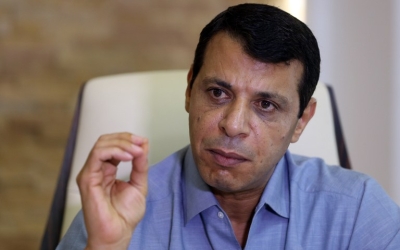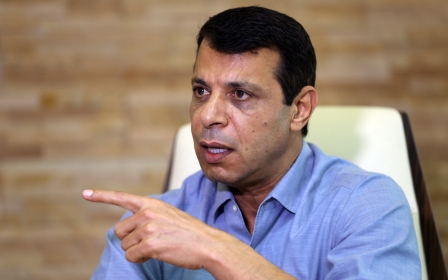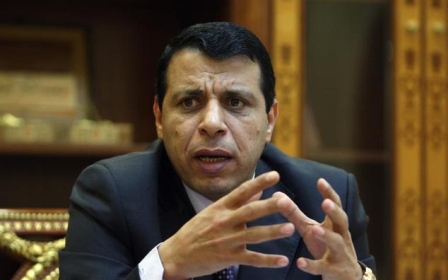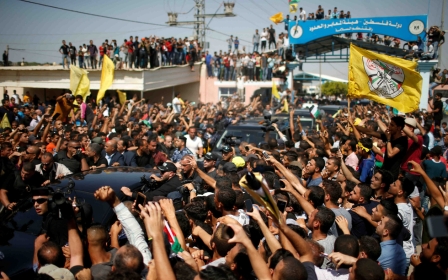Mohammed Dahlan: Philanthropist or notorious fixer?
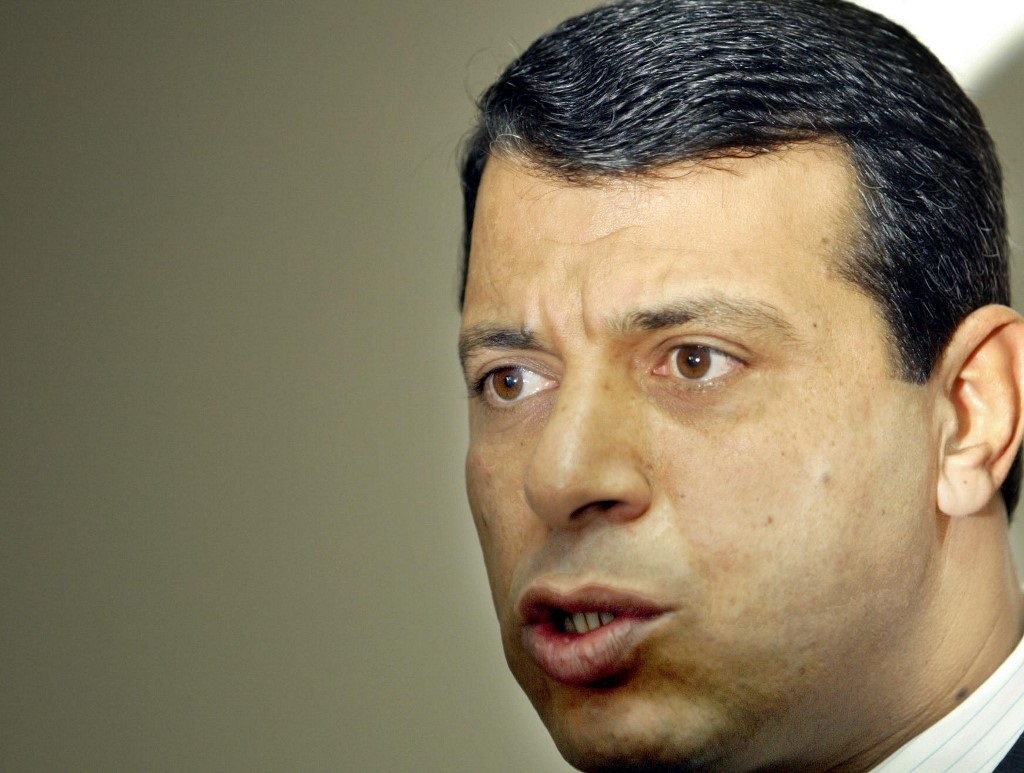
About two weeks after the abortive coup in Turkey in July 2016, I reported the allegation from a high-level Turkish security source that the United Arab Emirates had collaborated with the coup plotters, using the exiled Fatah leader Mohammed Dahlan as a go-between.
I reported the Turkish claim that Dahlan was alleged to have transferred money in the weeks before the coup and to have communicated with Fethullah Gulen, the cleric alleged by Turkey to have been behind the plot, via a Palestinian businessman based in the US.
My sources for this were impeccable - a high-level Turkish security source and other sources with links to the UAE. I stood by the story then, and I stand by it now. The story has remained on our website ever since.
About a year after publication, Dahlan sued me and Middle East Eye. There were several eye-catching elements to his legal claim.
The first was Dahlan’s attempt to portray himself as a “politician, businessman and philanthropist.” The second was the notion stated by his solicitors in pre-trial correspondence that their client had a “perfectly ordinary connection with the UAE”.
“Whilst our client makes no secret of the fact that he is a friend of the UAE, he is not employed by them, nor does he have any formal ties or allegiances in that regard,” his lawyers stated.
We set about defending ourselves. First, we argued that the allegation itself was of the highest public interest, concerning as it did attempts by one country to meddle in the affairs of another.
Second, we argued that the words complained of were not defamatory because Dahlan did not have a reputation to defend in this country nor in much of the Middle East.
Had this case gone to court, our lawyers would have had an interesting time cross examining Dahlan in the witness box, had he agreed to appear in person in the first place, about his description of himself as a “politician, businessman and philanthropist”.
'A hand in everything'
It is a fact that Dahlan was convicted in absentia by a Palestinian court on 15 December 2016 of stealing $16m and sentenced to three years’ imprisonment. So too are the claims by Dahlan’s former boss, Palestinian President Mahmoud Abbas, in relation to Yasser Arafat’s death and the deaths of other Palestinians, a matter of record.
All of these allegations have been denied by Dahlan and are subject to counter-allegations, but indubitably and collectively, they build a reputation for notoriety rather than for philanthropy.
Most curious of all was Dahlan’s claim that he did not have any formal ties with the country who is now sheltering him, a Palestinian exile
Why was Dahlan investigated by the International Criminal Court for his involvement with Saif al-Islam Gaddafi, the second son of the deposed Libyan leader?
Most curious of all was Dahlan’s claim that he did not have any formal ties with the country who is now sheltering him, a Palestinian exile.
If this were the case, why is there a video of Dahlan accompanying bin Zayed to a Serbian football club in 2013, picturing the Crown Prince passing gifts presented to him to Dahlan for safe keeping?
Why did Dahlan say in interview with the Monte Carlo Doualiya radio station in February 2015 that he had a “personal relationship” with the UAE leadership? And why would Dahlan have described the crown prince in an interview with Al-Youm7 on 1 September 2015 as his “brother and friend”?
More importantly why would the UAE ambassador to the United States, Yousef al-Otaiba, have had the following email exchange with Fadi Elsalameen on 1 July 2014?
“All of what is happening between Ethiopia and Egypt now is Abu Dhabi’s good work. We arranged that back channel. I can fill you in if you like. (We means, me Dahlan and a DC businessman you don’t know yet).”
Otaiba’s response was: “I know Dahlan has his hand in just about everything :-)”
And on, and on, and on it goes.
Our defence was quite a lengthy document. Dahlan’s lawyers called it prolix. It was, in fact, damning. Pity it will never be aired in court, though it and the other pleadings in the case can be accessed here.
One of the reasons why I thought the relationship between Dahlan and bin Zayed was of regional and international importance was because of the number of covert battles the two men have waged - in Palestine, in Egypt and the coup that overthrew Mohamed Morsi, the civil wars in Libya and Yemen, and the international campaign against the Muslim Brotherhood.
In response to the question of whether he had been involved in the coup against Morsi, Dahlan told Al Monitor on 3 January 2016 the following: "I played an active role as a Palestinian in backing the Egyptian people. It is a simple and limited role, but I assumed it because Egypt has interests in helping the Palestinian people.”
Turkish coup
And of course there is Turkey.
Dahlan told the Atlantic Treaty Association in Brussels in November 2015: “The entire movement of terrorism in Syria came through Turkey. You know this. But you are not bothered. Because you have political interest. Or I have no explanation why this is happening. I am not against Turkey. But I am against not exposing the facts of those who are not confronting ISIS, those who are providing it with financial facilities, trading in oil with it or smuggling weapons to it.”
For several hours after the coup attempt had begun in Turkey on 15 July 2016, the whereabouts of the Turkish president, Recep Tayyip Erdogan, was unknown.
During that period, media outlets linked to, or controlled by the Emiratis and the Saudis, were reporting that the coup had succeeded and that Erdogan had fled or was dead. When Erdogan turned up very much alive in Istanbul airport, an Al Arabiya news anchor observed on live television that it was regrettable the coup had not succeeded before rapidly correcting herself.
To observers like me, it was striking how well prepared the Gulf news media were for a story that was breaking in Turkey throughout the night.
When I got a call two weeks later from a senior officer in the Turkish security services, all became clear. When his information was independently verified by sources close to Abu Dhabi, I decided to publish.
After the coup misfired, the Emiratis became fearful of Erdogan’s reaction, whom they rightly thought of as someone who was “prone to revenge”. That was why they attempted to distance themselves, temporarily, from Dahlan.
The information that the UAE was involved in the coup was confirmed by Erdogan in June 2017: “We know very well who was happy in the Gulf during the coup attempt in Turkey. If they have intelligence agencies, so do we,” he said.
Foreign Minister Mevlut Cavusoglu backed this up by saying two weeks later: “We know that a country provided $3 billion in financial support for the coup attempt in Turkey and exerted efforts to topple the government in illegal ways. On top of that, it is a Muslim country.”
Cavusoglu did not name the country in public, but sources within his ministry confirmed to the government-controlled Daily Sabah that it was the UAE.
In May 2018, Cavusoglu went further. He told a closed briefing of Arab journalists in Istanbul that Dahlan was responsible for conveying funds from the UAE to the “Fetullah Gulen group” in Turkey for use in the failed coup.
Go slow
The attempt to portray Dahlan as a wounded philanthropist was not the only oddity of this case.
It had been launched nearly a full year after publication. Then it went dead for ten months. We, the defendants, found ourselves in the curious position of pushing the claimants to court rather than the other way round.
Three hours before we were due to exchange our respective electronic documents and material under the rules of disclosure Dahlan got cold feet and pulled out of the libel action against us.
He claimed in a press release on Twitter that he had got what he wanted from the English courts. Really?
Dahlan has now to pay a very large bill, which is Middle East Eye’s and my own legal costs, as well as his own. Together they are estimated to be in excess of £500,000. The original article is still being published by MEE.
Our journalism has been vindicated, and the decision to publish these allegations in the public interest has been proved right.
I leave the reader to decide for him or herself whether Dahlan really is a philanthropist with a “perfectly ordinary connection to the UAE”.
Middle East Eye propose une couverture et une analyse indépendantes et incomparables du Moyen-Orient, de l’Afrique du Nord et d’autres régions du monde. Pour en savoir plus sur la reprise de ce contenu et les frais qui s’appliquent, veuillez remplir ce formulaire [en anglais]. Pour en savoir plus sur MEE, cliquez ici [en anglais].



